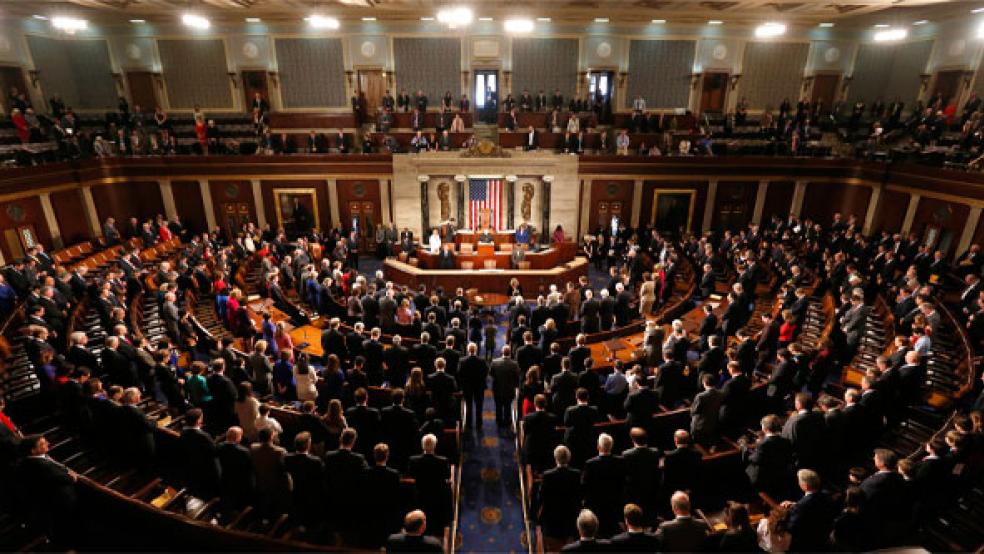House Speaker John Boehner didn’t bother to hit the reset button with the White House on Thursday when the new 113th Congress was sworn-in.

The wounds of the previous Congress have quickly aged into scars. Disputes over economic stimulus, the 2011 debt ceiling fight, and the frustration in passing a fiscal cliff deal this week all look like a prelude to the turmoil to come.
Boehner already had a weak grip on his fellow House Republicans. The majority opposed the cliff deal that averted an economy-crushing tax hike and delayed automatic spending cuts for two months. His relationship with President Obama appears to be in atters, with aides for the Ohio congressmen declaring that direct talks between the two men are niceties of the past.
As Boehner narrowly secured another term as speaker yesterday afternoon, it became clear that the turmoil of the past two years would bleed into the 113th Congress. He dedicated his re-election speech to the next battle with Obama: Another needed increased to the debt ceiling that the government technically breached last Monday. GOP lawmakers have told the White House that every dollar added to the government’s borrowing capacity must come attached with a dollar in reduced expenditures.
“At $16 trillion and rising, our national debt is draining free enterprise and weakening the ship of state,” said Boehner, summoning all of his gravitas with his gravelly voice. “The American Dream is in peril so long as its namesake is weighed down by this anchor of debt. Break its hold, and we begin to set our economy free. Jobs will come home. Confidence will come back. We do this not just to boost GDP or reduce unemployment, but to secure for our children a future of freedom and opportunity. Nothing is more important.”
His words sounded on the floor like a warning shot to Obama, rather than a call for cooperation.
Few have hopes that the new Congress will be more collegial than its predecessor.
SLIGHT CONGRESSIONAL SHIFTS
Sure, about 20 percent of the 435 House lawmakers are new—or newly returned. Tea Party firebrands like Florida’s Allen West and Illinois’ Joe Walsh will now likely take their shtick to the airwaves as ex-congressmen. The Democrats picked up nine seats—their ranks now including both the first Hindu and the first openly bisexual House members. Redistricting gave the GOP stronghold of Texas four new seats—three of them going to Democrats.
But the fundamental dynamics of the House stayed the same. The zeal of the Tea Party is still engrained in the GOP—with one vote for speaker given in protest to West. Gerrymandered congressional districts ensure that many Republicans and Democrats have little reason to consider the national interest and compromise. Several of the swing states won by Obama have delegations that tilt decisively toward the GOP: Florida (17-10), Michigan (9-5), Ohio (12-4), Pennsylvania (13-5), and Virginia (8-3).
As a lame-duck, Obama has already antagonized the Republicans by arguing for a debt ceiling increase with no strings attached, saying the government should not be held to a referendum on paying its bills.
“Changes in the membership of the two caucuses aren’t going to change the fact that Obama or Boehner could barely negotiate with each other to begin with,” Sean West, a political analyst for Eurasia Group, told The Fiscal Times.
West was among the few political observers and pundits who consistently argued that Congress would succeed in navigating the fiscal cliff. But he’s skeptical about a relatively easy move by Congress to address the debt ceiling over the next two months—at which point the emergency measures used by the Treasury Department will be exhausted and the government would risk default.
[Watch John Boehner Throw the First Punch in the Debt Ceiling War]
Boehner is still beholden to his Republican conference—and even with some high-profile departures it remains just as conservative as it was after the 2010 mid-terms swept the GOP into the majority. The Obama administration has repeatedly tried to use public opinion to pressure Republican lawmakers, a strategy that’s just as unlikely to work this time around.
“It’s not the speaker leading this revolution,” West said. “If you’re waiting for Boehner to read the polls and take a different tack, you’re going to be waiting a long time.”
Norman Ornstein, a resident scholar at the conservative American Enterprise Institute, commented in a blog last week that a major obstacle to creating a more amicable Congress rests with how districts are drawn to stop competitive general elections. And when Republicans do choose to compromise, they potentially face the wrath and financial resources of groups like the Club for Growth in primary elections.
“At least 50 and probably more GOPers in the House are largely immune to wider political trends, broader American public opinion, or for that matter the overall results of an election,” wrote Ornstein, the co-author of the book, It’s Even Worse than It Looks: How the American Constitutional System Collided with the New Politics of Extremism.
He told The Fiscal Times, “Resolving any of these issues on the fiscal side with an agreement that’s going to include the president and Republican leaders is almost certain to require more Democratic votes than Republican votes to pass it in the House. That’s a very hard thing for Boehner to do.”
It’s unlikely that the dynamic will change any time soon, Ornstein added.
Fear about this conservative bloc also informs how Democrats are thinking about budgetary issues. Rep. Peter DeFazio opposed the cliff agreement out of concerns that it did not address the debt ceiling—and warned that those across the aisle would hold government finances hostile unless steep cuts were made to Medicare and Social Security, in his words, “under the guise of responsibility.”
One way to possibly change the dynamic would be to require Congress remains in session a full five days a week, instead of the existing Tuesday-Thursday schedule, said Donald Wolfensberger, a senior scholar at the Wilson Center who was formerly a Republican chief of staff for the House Rules Committee.
The additional time would allow for more fleshed-out hearings and better legislation, Wolfensberger said. Members use the current schedule to tend to their districts and fundraise. And in a sign that nothing is changing, Congress will officially have 239 of this year’s 365 days off, according to the calendar kept by House Majority Leader Eric Cantor, R-Va.
“The leadership is reflecting their followers. And the members themselves like the way things are right now. They’re not clamoring to spending more time on their committees,” said Wolfensberger. “It’s a culture of convenience.”




